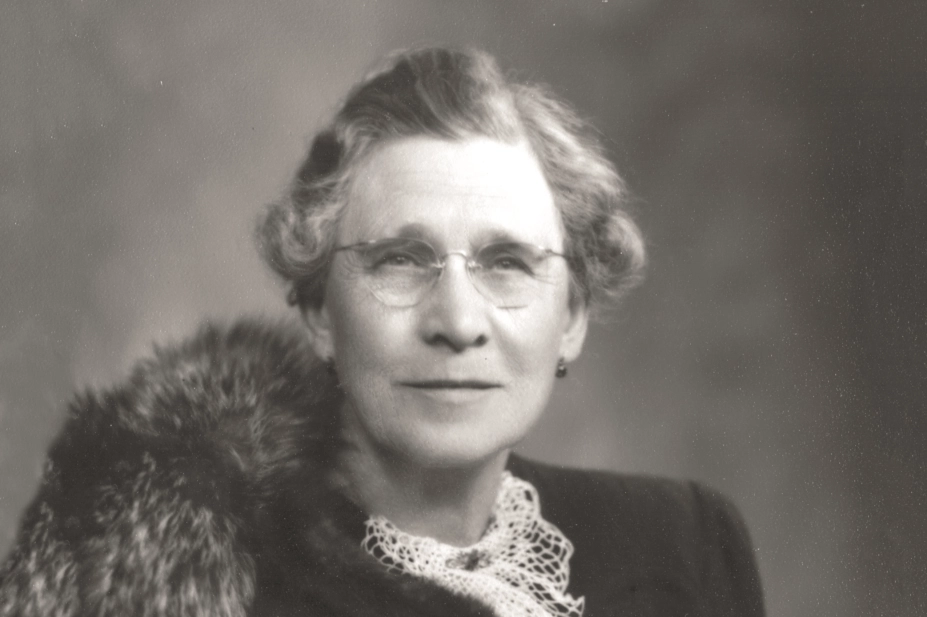
RPS Museum
The National Health Service (NHS) celebrates its 70th birthday on 5 July 2018. In January 1948, a rousing message from Jean Kennedy Irvine, the Society’s first woman president, greeted members on opening their New Year’s issue of The Pharmaceutical Journal
[1]
. “Will [this year] be an ‘Annus mirabilis’?” she wrote. “It can be if we pharmacists, standing on the threshold of a new era for pharmacy, are prepared to put the old world, with its animosities, passions, prejudices, and habits, behind us.”
“There can be no standing still,” she continued, “no mere repetition of the old days, waiting for the ‘opportune time’ — which never comes”. The editorial that followed emphasised the need for pharmacists to be “fully prepared for the opportunities of 1948”. They should make immediate plans: an increase in prescriptions for dispensing was certain, and the supply of “adequate qualified staff” in the new system would pose a challenge.
“The long-term policy should be the remodelling of our pharmacies on the best Continental lines, adapted to British requirements,” the editorial continued. The first step, in that case, would be to provide “all necessary apparatus, books of reference, laboratory facilities, and so on”. Furthermore, the National Health Service Act had emphasised the importance of the dispensing department, which needed to be the “outstanding feature of the pharmacy … for by no other means [could] pharmacy hope to emerge as a profession parallel with that of medicine or dentistry.”
Meanwhile, in letters to the editor, pharmacists shared their views on the profession within the context of the NHS: “With the advent of the National Health Service now is the time to build anew,” according to a reader writing under the name of Labor Omnia Vincit. “Aneurin Bevan is a supporter of the well-qualified … But what will he and his advisers think pharmacy is worth, if we still say that a two-years’ course is adequate, when medicine demands nearly six years, dentistry four years.”[2]
IH Williams warned that “with the approach of the ‘Appointed Day’ for the inauguration of the National Health Service, the one-man pharmacy is threatened with criticism from all sides if he is unable to cope with the onrush of clients all queueing up to take advantage of the free treatment offered to them”[3]
.
“Will the pharmacist’s present low status be in any way improved under the new scheme?” asked FG Tolman. “I have had 4 years’ hospital experience plus 17 years in retail, and I know that by both the general public and by the medical and other professions the retail pharmacist is still regarded as a common or garden tradesman. In the hospital world he shines among the lesser lights of the institution … The pharmacist’s status in society is still no better than it was 20 years ago.”[4]
In a speech to the North Staffordshire Branch, reported in the Pharmaceutical Journal, HN Linstead, the Society’s secretary and registrar raised his concerns ahead of the NHS’s inauguration[5]
. Material and man-power shortages would certainly affect the service delivered, he said, pointing out that these were “national rather than pharmaceutical problems”. Some areas of the country might need health centres due to a lack of “chemists’ shops,” he continued, adding: “We do not want to see the exceptional post-war shortages resulting in our profession of pharmacy becoming so closely regulated by the state that we are going to cease to become individual practitioners with pharmacy forced into a public service mould.”
Linstead also said that the Society had introduced educational reforms as the new health service came into being. “We believe that with recent developments of medical science and with the obligations of the new methods of treatment, we are going to find in 20 or 30 years’ time that for pharmaceutical establishments to be really up to date, you will have to have somebody of university degree standard in charge.”
In her address to attendees at the Royal Pharmaceutical Society’s Annual General Meeting of 22 May 1948, Jean Kennedy Irvine made the point that the direction of pharmacy under the new service depended upon the outlook of pharmacists themselves[6]
. “Will the new service be the beginning of a new era for pharmacy? The answer is both ‘yes’ and ‘no’. ‘Yes’, if the pharmacist uses the opportunity that the service will afford him to strengthen his professional position; and if he accepts the logic of that position and is prepared to go wherever it may lead him, rejecting anything which hampers him in the exercise of his professional duties.
“The answer will be ‘No’ if the pharmacist persists in pursuing the commercial course which he has claimed, rightly or wrongly, his insecure economic position in the past has forced upon him. The answer depends upon the pharmacist himself.”
References
[1] Message from the President. The Pharmaceutical Journal 1948; 160(4392):1–2
[2] Letters to the Editor. The Pharmaceutical Journal 1948; 160(4393):30
[3] Letters to the Editor. The Pharmaceutical Journal 1948; 160(4397):101
[4] Letters to the Editor. The Pharmaceutical Journal 1948; 160(4398):121
[5] Problems of the New Service. Materials: Manpower. The Pharmaceutical Journal 1948; 160(4402):187
[6] The Annual General Meeting: Statement by the President. The Pharmaceutical Journal 1948; 160(4412):356–357
You may also be interested in
Long service of members

Membership fees 2022
